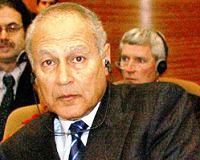African quintet on Darfur rejects foreign interference in Sudan
CAIRO, Dec 12, 2004 (MENA) — The African quintet mechanism on Darfur wrapped up its ministerial meeting here Sunday by reaffirming opposition to any foreign interference in the problem.
 The meeting was attended by Egyptian Foreign Minister Ahmad Abu-al-Ghayt, Sudanese counterpart Mustafa Osman Ismail and Libyan opposite number Abd-al-Rahman Shalqam.
The meeting was attended by Egyptian Foreign Minister Ahmad Abu-al-Ghayt, Sudanese counterpart Mustafa Osman Ismail and Libyan opposite number Abd-al-Rahman Shalqam.
Also taking part were Senator Lawan Guba, Nigeria’s Minister of Cooperation and Integration in Africa, and the ambassador of Chad, on behalf of his foreign minister.
Present were Baba Gana Kingibe, the special representative of the chairman of the Commission of the African Union, as well as a representative of the Arab League.
The participants reviewed all the developments in Darfur and the efforts exerted to deal with the situation there since the Quintet summit held in Tripoli on 17 October.
They agreed on “stressing the leading role of the African Union in the problem of Darfur, and rejecting any foreign interference in this problem, according to Tripoli’s Declaration,” read the final communique.
The participants also welcomed “the cooperation and coordination between the African Union and the Arab League in dealing with the Darfur problem as a concrete expression of the Afro-Arab brotherhood.”
The Quintet also welcomed “the compliance of all parties with the call of Tripoli’s Summit by signing the protocols on the enhancement of the security situation and on the improvement of the humanitarian situation in Darfur, which were signed in Abuja on 9 November 2004, and urging them to fully comply with the agreements signed by them, which pave the way to reach a comprehensive political solution of the problem.”
The African quintet mechanism also urged “all parties to abide by the N’djamena’s ceasefire agreement signed on 8 April 2004, and exercise the highest degree of self-restraint, aiming at saving the lives of the peoples of Darfur, ensuring the delivery of humanitarian aid to them, facilitating their voluntary return to their original villages and places of abode and pushing forward the efforts of the rehabilitation and development in the three parts of Darfur.”
It appealed to the international community and all African parties to offer all kinds of support and assistance to assure of the African Union’s monitoring mission and protection force in Darfur.
The participants also urged the parties “to quickly reach an agreement on the declaration of principles (DOP) during the current round of talks in Abuja, as the DOP constitutes a stepping stone leading to the comprehensive solution of the Darfur problem in all its political, economic and social aspects.”
They stressed “the necessity for the international community to boost its endeavours to assist the Sudanese government to promote its capabilities to address the situation resulting from this problem (Darfur). ”
The participants expressed appreciation, in this respect, for “the assistance provided by neighbouring countries to Sudan, especially Egypt, Libya, Chad.”
They agreed to hold the next meeting in Tripoli in January 2005.
Speaking at a joint press conference with his Sudanese counterpart, Abu-al-Ghayt denied reports about threatening to use force against Sudan.
“I never heard of such a thing. On the contrary, there was no reference to the use of force in the UN Security Council resolution,” he added. Abu-al-Ghayt said the African efforts on Darfur have been focussing since the very beginning on settling the issue within an African framework.
Osman, for his part, said in a news conference following the meetings that the Abuja talks were scheduled to kick off Saturday 11 December but were delayed for 24 hours pending the arrival of rebel leaders. He said, meanwhile, that talks were proceeding with the Sudan People’s Liberation Movement (SPLM) in Kenya. “The vice president reported to the president that 50 percent of the problems were handled,” Osman said. He sounded upbeat that the two sides would meet the end of the year’s deadline to sign a comprehensive peace agreement.
On the Yemeni initiative to bridge gaps between Sudan and Khartoum, Osman welcomed any such efforts by Yemen, Egypt or Libya. The Sudanese top diplomat said his country harbours no hostilities towards Eritrea and is rather keen on at least normal ties with the neighbouring country based on mutual respect.
